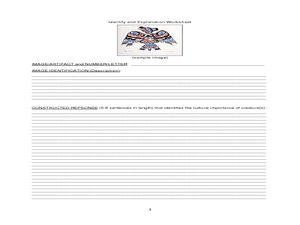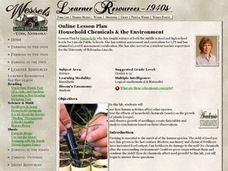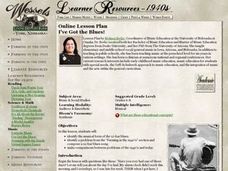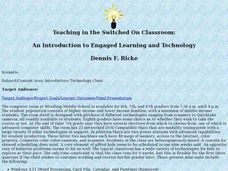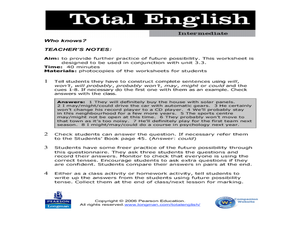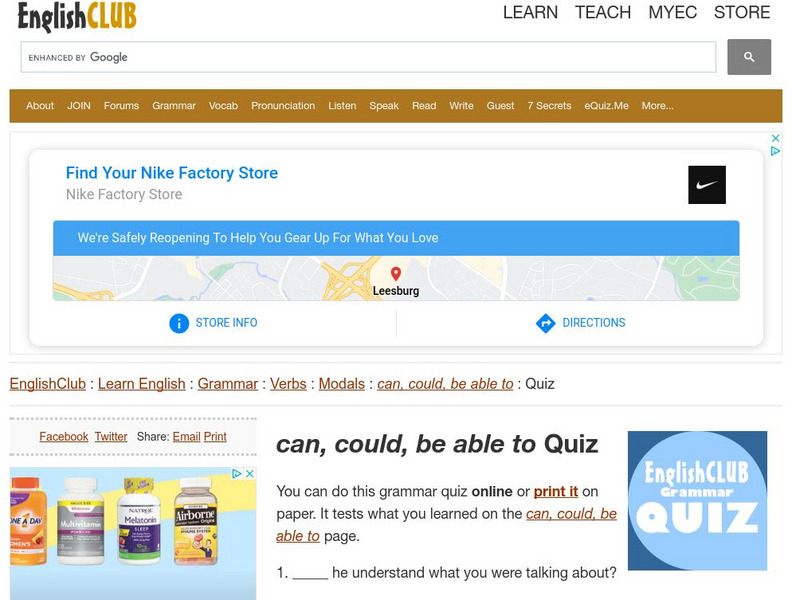Curated OER
Uncle Sam Wants You!
Students examine several narratives exploring attitudes to World War II involvement at the time. They develop their own opinions and write a fictional personal narrative to record their observations.
Curated OER
Japan: Yesterday and Today
Students study the geography and culture of Japan and discover important historical events. They look at the religions of Japan. They determine similarities and differences in the lives of teenagers in Japan and the US. They read and...
Curated OER
Parts of Speech
In this parts of speech activity, students read about the different parts of speech including past, present, future, singular, plural, and more. Students complete a quiz on the parts of speech where they answer 10 multiple choice questions.
Curated OER
Stories Behind Pacific Northwest First Nations' Images
Students investigate Canadian culture by examining mascots of the 2010 Olympics. In this Canadian history lesson, students read a Vancouver Olympics guide to identify three Canadian mascots and their importance to the First Nations...
Curated OER
Novel Analysis
Students read the novel, Lord of the Flies, then write an essay analyzing the novel. They analyze, in small groups, characters, plot, setting, style, symbolism, theme, critical responses, and historical influences
Curated OER
Household Chemicals & the Environment
High schoolers conduct a laboratory experiment designed to investigate the effects of chemicals, soil quality and pollution on seed growth and plant yield. They consider how best to maximize agriculture in the long term.
Curated OER
I've Got the Blues!
Students identify the musical form of the 12-bar blues. They identify a problem from the "Farming in the 1940's" section and compose a 12-bar blues song. make comparisons between problems of the 1940's and today.
Curated OER
Describing Patterns
Fourth graders investigate repeating and growing patterns. Models, graphs and words are used to describe, extend and represent patterns. Students use evidence from models and graphs to support the identification of patterns.
Curated OER
How Worldly Are You?
Sixth graders locate and map six components to have a working knowledge of maps. For this map skills lesson, 6th graders define the six map components and work in groups to draw a map using the components. Students read a related...
Curated OER
Developing Grammar
Students work on grammar with annual events and past tenses respectively. They drill and practice independently and in small groups. Students' extend their linguistic precision when talking about their lives.
Curated OER
Teaching in the Swithched On Classroom
Students engage in activities to help them develop computer skills and other various problem solving methods. They also work collaboratively, and apply technology in an ethical way.
Curated OER
Total English Intermediate: Who Knows?
In this intermediate future tenses practice worksheet, students complete 8 sentences by following the prompts. Students also respond to 3 short answer questions pertaining to future tenses.
Curated OER
Global Music Lesson Plans: Britten and Japan – Japan and the UK
Students explore the links between Japanese and British culture. In this Japanese music lesson, students listen to their instructor present a lecture regarding Gagaku music and then perform "Te Lucis Ante Terminum" with Japanese...
Curated OER
GI's, Gals & Gardens
Students, in groups, design a war participation campaign for a specific audience during WWII. They design posters and prepare an oral presentation for the class.
Curated OER
Disappearing Magic Factors
Students identify, through the number of rows and columns, the factors related to the product. In turn, they also discover how to find the missing factor, which is part of the fact family for that product.
Curated OER
Nature Notes
Learners spend some time outdoors and record their observations of abiotic conditions, geologic surroundings and living organisms. They reflect and write about the experience of being observant in nature.
Curated OER
Charting the Heights
Students enter data regarding the height of classmates into a spreadsheet. Formulas will also be entered to find the median, mean, and mode of the data.
Curated OER
Social Problems -- Lesson 2
Students in an adult ESL class continue to examine the problems faced by those who live in Africa. In groups, they read an article on the internet and analyze how the people in the country are taking care of the problem of AIDS. They...
Curated OER
Pottery
Students create an original piece of pottery. They produce a repeating pattern on their pottery piece and reproduce their pattern either linguistically or musically. They determine the meaning of various idioms about mud and write an...
PBS
Pbs Learning Media: Modal Auxiliary Verbs
Modal auxiliary verbs indicate expressions of belief, attitudes, likelihood, permission, or obligation. They inform the function of the main verb, and color the verb on a scale ranging from possibility to necessity. Video (0:47)
English Club
English Club: Learn English: Grammar: Verbs: Modal Verbs
An explanation and examples of modal verbs with links to additional information about specific modals.
English Club
English Club: Learn English: Grammar: Verbs: Modals: Can/could/able Quiz
Choose the correct modal verb (can, could, or able) to complete each of the ten-sentences in this quiz. Answers can be checked upon completion.
TES Global
Blendspace: Modal Verbs
A twelve-part learning module to use while teaching modal verbs. Links include an images, charts, and videos on modal verbs.
Capital Community College Foundation
Guide to Grammar and Writing: Helping and Modal Auxiliary Verbs
A helping and modal auxiliary verb site from the Capital Community College. Use this site as a reference tool when learning about modal auxiliary verbs.
Other popular searches
- Learning Modalities
- Different Learning Modalities
- Learning Modalities Quiz
- English Learning Modalities



